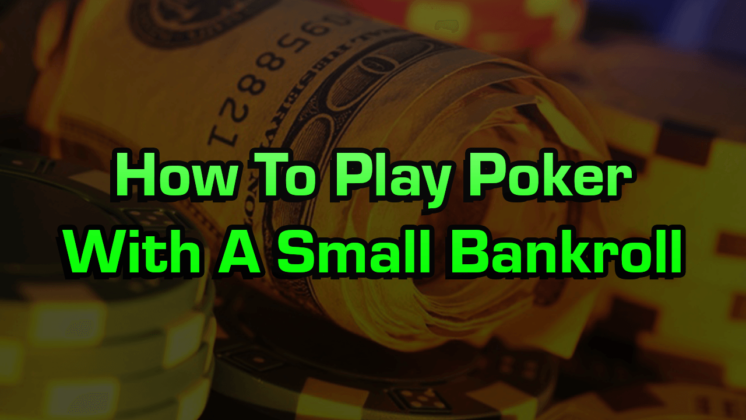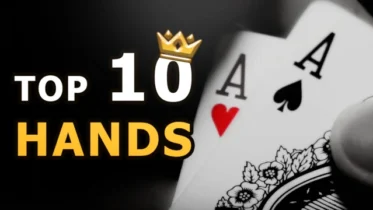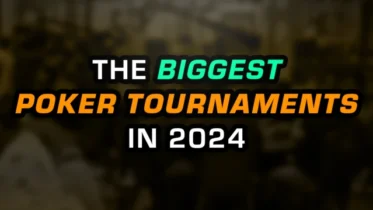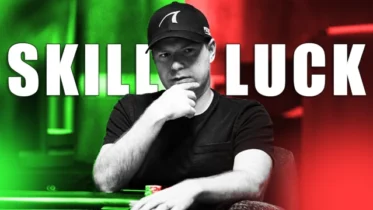Every poker player has to start somewhere, and often times starting from square one means starting your poker journey with a small bankroll. No one starts their poker career adequately bankrolled for high roller poker tournaments, but how do you properly manage a minimal bankroll and eventually move up stakes? Study the lessons I outline in this article, and you will be properly prepared to manage your poker finances.
Know Your Poker And Bankroll Goals
Pursuing Poker As A Career
One of the most important tasks to accomplish before committing yourself to poker is establishing what your goals are. A lot of people are quick to say “I want to be a professional poker player” but are not in the best situation to accomplish such an ambitious goal. If you have a spouse and children, unless you have no other options striving to become a professional poker player is likely not a good idea.
If you are a young person who only has to worry about themselves and has few responsibilities, you are in a good position to pursue poker as a career if you are willing to put the time and effort in.
Playing Poker To Make Money
While you can win a significant amount of money playing poker, it is important to acknowledge the variance of the game. All the time I get emails from students saying “I want to make $500 a month playing poker, how do I do it?”
It is impossible to commit to making a set amount of money each month and following through with it. Due to the swings that come with poker, sometimes you will make more than $500, sometimes you will make less than $500, and some months you may even lose $500.
When it comes to poker, most of the outcome is outside of your control. All you can do is study, put in the right amount of volume, and hope for the best. If you find a game you can beat, put in a ton of volume, and keep a proper bankroll, you will likely make money in the long run.
Playing Poker For Fun
Although you will likely have more fun winning than losing, if you are purely playing poker for fun you really don’t have to commit that much time to studying the game. As long as you are not recklessly torching money and putting yourself at risk of financial ruin, play poker at your leisure and enjoy the game!
Even if you are just playing for fun, it is not a bad idea to stick to smaller stake games as it will help limit eventual losses. It is okay to play poker just for fun, but sticking to the proper stakes will help prevent your fun hobby from becoming a problem!
Game Selection And Your Bankroll
Especially if you have a limited bankroll, start out by playing for small stakes. When looking for small stakes cash games and poker tournaments, be sure you are aware of the rake and that the rake percentage isn’t so high that the game is not beatable.
What is considered “small” stakes for one poker player as opposed to another is entirely dependent on their financial standing. If two people have just started playing poker, but one is a millionaire and the other a sophomore in college, they may very well have different definitions of what they consider small stakes.
When I first started playing poker online at the age of 18, my first deposit was $50, which meant I was playing the tiniest stakes offered at that time. If you start small and gradually gain experience and knowledge in games you can afford to lose in, eventually you can grow your bankroll and move up when you are ready.
Cash Games Or Poker Tournaments?
The biggest difference between cash games and tournaments is the time commitment each variation of poker requires. While cash games usually consist of tougher competition, you can play at your discretion and leave the poker table at any time. Even though poker tournaments are usually softer than cash games, they can be quite the time commitment especially if you make it all the way to the final table.
When considering the financial aspect of both cash games and tournaments, it is important to know that cash games provide more consistent profit if you are playing in games you can beat. Due to the high variance of poker tournaments, scores can be sporadic even if they are for big sums. If you are looking for the easiest way to make money playing poker, live cash games are by far the best option.
Bankroll Requirements
One of the big perks of having a job outside of playing poker is that you have a dependable source of income that is not affected by your performance on the felt. If you make enough money and have the right circumstances, some of the money you make from your job can be used as disposable income.
“Income remaining after deductions and other mandatory charges, available to be spent or saved as one wishes.”
Disposable Income
If you have disposable income and play the right stakes for your financial standing and skill level, in essence, you have an unlimited bankroll as you can afford to lose when you know more money is coming. While I am not saying you should continue torching a significant amount of your income if you are a losing player, if you have stable income it is not a requirement to always have 100-300 buy-ins in cash on hand. That being said, here are the bankroll requirements I recommend to players who have a decent edge:
30 buy-ins for soft cash games
100 buy-ins for tough cash games
100 buy-ins for small field tournaments
300 buy-ins for large field tournaments
Knowing When To Move Up Stakes
Avoid Moving Up Stakes Too Quickly
If you want to maintain a healthy and stable bankroll, do not be too quick to move up stakes. A lot of poker players are eager to push their boundaries and compete for bigger scores, but while poker is a great way to get rich slowly, it is a terrible way to try and get rich quickly.
One time I interviewed Daniel Negreanu, and he shared how in his younger days he would sit down at a cash game table where he was bankrolled for 10-15 buy-ins in that specific game. If he won up to 20-25 buy-ins, he would immediately move up, if he lost and his bankroll dwindled to 5 buy-in’s, he would move down stakes and would again have 10-15 buy-ins for the current game he was playing.
While we all know Negreanu would eventually go on to be one of the most successful poker players ever, in his early days he went broke all of the time with his aggressive bankroll strategy. Although the “gamble gamble” nature of Negreanu’s early poker career may paint a romantic picture of making it as a poker player, it is not sustainable if you are not one of the best players in the world.
The media almost exclusively highlights the winners of the poker community, they display the splashy and aggressive players who are willing to risk large portions of their net worth betting on themselves. Even though there are players who pull off huge scores risking money they could not afford to lose, there are even more players who failed while attempting the same.
Staying within the proper stakes and practicing proper bankroll management may keep you from “getting rich quick”, but it will also keep you from going broke. There may be some poker players who are comfortable with not knowing where they will be staying or where their next meal will be coming from, but if you are like me you like the security of a properly managed budget.
How To Effectively Move Up To Higher Stakes
The biggest indicator that you are ready to move up is if you are winning. Naturally, if you are winning in poker tournaments and cash games you have more money, the main requirement to move up!
While I have discussed poker players who are too eager to move up stakes, I have yet to mention the other poker players who get nervous when it comes to playing in bigger games and events. If you are properly bankrolled and have proven yourself in the usual stakes you play at, be confident and don’t be hesitant when it is time to “take a shot”.
Moving Up Stakes In Poker Tournaments
When looking to take a shot at a higher stakes cash game or tournament, look for a game that is soft and two times your usual buy-in. Avoid taking gigantic shots (like a $3,500 tournament if you usually play $100 tournaments) as the players will be far too skilled and you will be far too concerned with simply cashing rather than playing optimally.
If you are a crusher at your local poker room and build a poker tournament bankroll of $10,000-$15,000 over a year, do not take your year’s worth of winnings to the World Series of Poker with dreams of winning a bracelet. Too often I see players who make a good profit playing in local poker tournaments blow all of their hard-earned winnings entering a handful of WSOP events.
With the variance of large field poker tournaments, even good players have a low probability of success and more often than not blow their bankroll trying to make it big at the WSOP. Instead of taking huge shots at the WSOP, successful small field tournament players are better off moving up to more reasonable stakes and growing their bankroll methodically. By putting the time in and moving up slowly but surely, eventually these players can be bankrolled for a full WSOP schedule.
Moving Up Stakes In Cash Games
For cash games, look to take shots in soft games where you know you will have an edge. If you are playing $1/$3 in your local poker room and a clear recreational wanting to gamble stumbles in to start a $5/$10 game, take advantage of the opportunity and grab a seat.
Taking a shot in a higher stakes game not only gives you a chance to substantially grow your cash game bankroll, but if you happen to lose you know you can make up for it at the lower stakes. If you are given an opportunity to take a calculated risk at higher stakes, do not be afraid to go for it.
If you have a substantial win-rate and can maintain it at the higher stakes, essentially you can double your profits at the poker table by moving up. Again, if you are properly bankrolled and have proven yourself, do not be scared to take a shot when it is time. Worst case, you move back down to stakes you know you can beat and can start preparing yourself for when it is time to take another shot.
Can you bluff with the best of them? Take the quiz that tells you!
Do Not Have An Ego At The Poker Table
I have seen a lot of decent poker players go broke because they refused to accept reality. Just because you moved up stakes and had success for a period of time, if your bankroll deteriorates and you cannot afford the current stakes you are playing you must move down.
Often tournament players will bink a huge score and all of a sudden have the money to enter tournaments with buy-ins five times the size of the ones they are used to. Just because a player hits a huge score, it does not mean they developed the necessary skills to move up overnight. Even if you are bankrolled for the higher stakes, you must ask yourself if you are really ready to take on the next level.
Never Stop Studying Poker Strategy
The worst thing you can do if you experience success at the poker table is to stop studying. Often a byproduct of success at the poker table is the result of proper study, if you are a winning player but all of a sudden decide that you do not need to study anymore, you lose one of the main ingredients contributing to your success.
A lot of successful poker players, including myself, have fallen into the mindset that they no longer need to study. They think they have achieved the necessary skill level to simply grind and continue winning, but the constant evolution of poker strategy makes studying the game regularly a requirement for success. Being a well-studied poker player gives you an edge at the table, in order to maintain that edge you must be willing to continue studying no matter how successful you are.
Conclusion
The three key ingredients to being a profitable poker player are as follows: find a game you can beat, play it a lot, and keep a proper bankroll. While variance will always cause you to experience significant upswings and downswings from time to time, sticking to these three principles will help ensure you are profitable in the long run. As with anything in life, if you are willing to put in the time and effort to be successful, you can be a successful poker player even if you start with a small bankroll.



